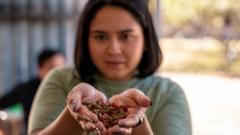In Honduras, where fried foods are a staple of the diet, used cooking oil presents both a challenge and an opportunity. Hugo Daniel Chávez, a 27-year-old project manager at Sustenta Honduras, envisions transforming waste into valuable resources. "We have so many businesses and domestic practices that create waste, so we are trying to transform waste and give it a second life," he tells BBC.
Each year, several million tons of cooking oil are consumed across Latin America, often resulting in health hazards for consumers when reused improperly. With many businesses contributing to this problem, the NGO's mission is to combat detrimental environmental effects caused by the disposal of used oil, which can contaminate water sources and damage infrastructure.
In response to these challenges, Sustenta offers to buy and regularly collect used cooking oil from local businesses. Their objective was to provide businesses an incentive to dispose of the oil responsibly while simultaneously converting it into sellable products like soap and dog food.
Increasing sustainability in Honduras, the project gained recognition and a $20,000 prize at the 2023 Youth4Climate Energy Challenge, a global initiative co-led by the United Nations Development Programme. Backed by funding from the Netherlands embassy, this initiative emphasizes social impact. "It not only contributes to lessening the environmental impact through an emphasis on creating a circular economy, but also empowers young people and women—the groups most affected by climate change," said a spokeswoman from the embassy.
In partnership with retail giant Walmart, Sustenta ensures a steady source of used cooking oil, a critical factor for scaling production. "We needed a reliable flow to scale up production. Otherwise, we could quickly run out of used cooking oil because of the black market that is competing with us," Mr. Chávez stated.
Once collected, the oil is processed in Comayagua, beginning with purification and leading to saponification—where fats or oils react with an alkali to create soap. With a commitment to building a circular ecological system, Sustenta remains innovative by collaborating with other local plants, utilizing waste water for their production processes.
Sales from their soap, priced at 15 lempiras (£0.45) per bar, bring in over 106,000 lempiras monthly, contributing to local income while fostering environmental stewardship. Mr. Pineda, Sustenta's executive director, emphasizes a sustainable approach: "We help with implementation of the project, and as soon as it's up and running we seek new opportunities."
Comprised mostly of individuals under 30, the organization's youthful energy drives a departure from typical approaches to environmental issues in the region. While other groups may confront large companies or hold politicians accountable, Sustenta focuses on creative solutions to environmental challenges. Paola Acevedo, the project coordinator, underscores the importance of balance: “This type of classical environmentalism is very important. We try to focus on solutions, while others fight on the front lines."
The innovative recycling of cooking oil is just one facet of Sustenta’s multifaceted approach to balancing economic development with environmental preservation.
Each year, several million tons of cooking oil are consumed across Latin America, often resulting in health hazards for consumers when reused improperly. With many businesses contributing to this problem, the NGO's mission is to combat detrimental environmental effects caused by the disposal of used oil, which can contaminate water sources and damage infrastructure.
In response to these challenges, Sustenta offers to buy and regularly collect used cooking oil from local businesses. Their objective was to provide businesses an incentive to dispose of the oil responsibly while simultaneously converting it into sellable products like soap and dog food.
Increasing sustainability in Honduras, the project gained recognition and a $20,000 prize at the 2023 Youth4Climate Energy Challenge, a global initiative co-led by the United Nations Development Programme. Backed by funding from the Netherlands embassy, this initiative emphasizes social impact. "It not only contributes to lessening the environmental impact through an emphasis on creating a circular economy, but also empowers young people and women—the groups most affected by climate change," said a spokeswoman from the embassy.
In partnership with retail giant Walmart, Sustenta ensures a steady source of used cooking oil, a critical factor for scaling production. "We needed a reliable flow to scale up production. Otherwise, we could quickly run out of used cooking oil because of the black market that is competing with us," Mr. Chávez stated.
Once collected, the oil is processed in Comayagua, beginning with purification and leading to saponification—where fats or oils react with an alkali to create soap. With a commitment to building a circular ecological system, Sustenta remains innovative by collaborating with other local plants, utilizing waste water for their production processes.
Sales from their soap, priced at 15 lempiras (£0.45) per bar, bring in over 106,000 lempiras monthly, contributing to local income while fostering environmental stewardship. Mr. Pineda, Sustenta's executive director, emphasizes a sustainable approach: "We help with implementation of the project, and as soon as it's up and running we seek new opportunities."
Comprised mostly of individuals under 30, the organization's youthful energy drives a departure from typical approaches to environmental issues in the region. While other groups may confront large companies or hold politicians accountable, Sustenta focuses on creative solutions to environmental challenges. Paola Acevedo, the project coordinator, underscores the importance of balance: “This type of classical environmentalism is very important. We try to focus on solutions, while others fight on the front lines."
The innovative recycling of cooking oil is just one facet of Sustenta’s multifaceted approach to balancing economic development with environmental preservation.





















